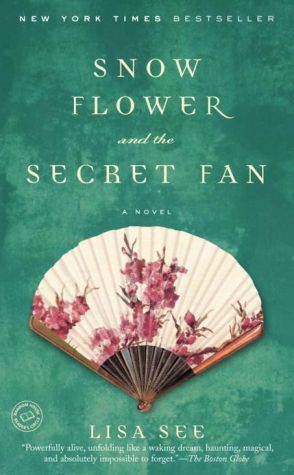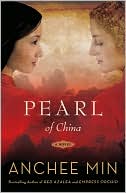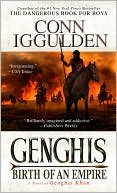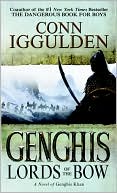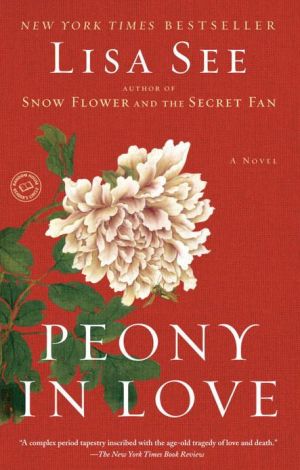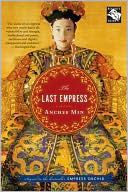Snow Flower and the Secret Fan
In nineteenth-century China, in a remote Hunan county, a girl named Lily, at the tender age of seven, is paired with a laotong, “old same,” in an emotional match that will last a lifetime. The laotong, Snow Flower, introduces herself by sending Lily a silk fan on which she’s painted a poem in nu shu, a unique language that Chinese women created in order to communicate in secret, away from the influence of men. As the years pass, Lily and Snow Flower send messages on fans, compose stories on...
Search in google:
Lily is haunted by memories of who she once was, and of a person, long gone, who defined her existence. She has nothing but time now, as she recounts the tale of Snow Flower, and asks the gods for forgiveness.In nineteenth-century China, when wives and daughters were foot-bound and lived in almost total seclusion, the women in one remote Hunan county developed their own secret code for communication: nu shu ("women s writing"). Some girls were paired with laotongs, "old sames," in emotional matches that lasted throughout their lives. They painted letters on fans, embroidered messages on handkerchiefs, and composed stories, thereby reaching out of their isolation to share their hopes, dreams, and accomplishments.With the arrival of a silk fan on which Snow Flower has composed for Lily a poem of introduction in nu shu, their friendship is sealed and they become "old sames" at the tender age of seven. As the years pass, through famine and rebellion...The Washington Post - Judy Fong BatesThe wonder of this book is that it takes readers to a place at once foreign and familiar -- foreign because of its time and setting, yet familiar because this landscape of love and sorrow is inhabited by us all. Snow Flower and the Secret Fan is a triumph on every level, a beautiful, heartbreaking story.
Chapter 1\ Milk Years\ My name is Lily. I came into this world on the fifth day of the six month of the third year of Emperor Daoguang’s reign. Puwei, my home village, is in Yongming County, the county of Everlasting Brightness. Most people who live here are descended from the Yao ethnic tribe. From the storytellers who visited Puwei when I was a girl, I learned that the Yao first arrived in this area twelve hundred years ago during the Tang dynasty, but most families came a century later, when they fled the Mongol armies who invaded the north. Although the people of our region have never been rich, we have rarely been so poor that women had to work in the fields.\ We were members of the Yi family line, one of the original Yao clans and the most common in the district. My father and uncle leased seven mou of land from a rich landowner who lived in the far west of the province. They cultivated that land with rice, cotton, taro, and kitchen crops. My family home was typical in the sense that it had two stories and faced south. A room upstairs was designated for women’s gathering and for unmarried girls to sleep. Rooms for each family unit and a special room for our animals flanked the downstairs main room, where baskets filled with eggs or oranges and strings of drying chilies hung from the central beam to keep them safe from mice, chickens, or a roaming pig. We had a table and stools against one wall. A hearth where Mama and Aunt did the cooking occupied a corner on the opposite wall. We did not have windows in our main room, so we kept open the door to the alley outside our house for light and air in the warm months. The rest of our rooms were small, our floor was hard-packed earth, and, as I said, our animals lived with us.\ I’ve never thought much about whether I was happy or if I had fun as a child. I was a so-so girl who lived with a so-so family in a so-so village. I didn’t know that there might be another way to live, and I didn’t worry about it either. But I remember the day I began to notice and think about what was around me. I had just turned five and felt as though I had crossed a big threshold. I woke up before dawn with something like a tickle in my brain. That bit of irritation made me alert to everything I saw and experienced that day.\ I lay between Elder Sister and Third Sister. I glanced across the room to my cousin’s bed. Beautiful Moon, who was my age, hadn’t woken up yet, so I stayed still, waiting for my sisters to stir. I faced Elder Sister, who was four years older than I. Although we slept in the same bed, I didn’t get to know her well until I had my feet bound and joined the women’s chamber myself. I was glad I wasn’t looking in Third Sister’s direction. I always told myself that since she was a year younger she was too insignificant to think about. I don’t think my sisters adored me either, but the indifference we showed one another was just a face we put on to mask our true desires. We each wanted Mama to notice us. We each vied for Baba’s attention. We each hoped we would spend time every day with Elder Brother, since as the first son he was the most precious person in our family. I did not feel that kind of jealousy with Beautiful Moon. We were good friends and happy that our lives would be linked together until we both married out.\ The four of us looked very similar. We each had black hair that was cut short, we were very thin, and we were close in height. Otherwise, our distinguishing features were few. Elder Sister had a mole above her lip. Third Sister’s hair was always tied up in little tufts, because she did not like Mama to comb it. Beautiful Moon had a pretty round face, while my legs were sturdy from running and my arms strong from carrying my baby brother.\ “Girls!” Mama called up the stairs to us.\ That was enough to wake up the others and get us all out of bed. Elder Sister hurriedly got dressed and went downstairs. Beautiful Moon and I were slower, because we had to dress not only ourselves but Third Sister as well. Then together we went downstairs, where Aunt swept the floor, Uncle sang a morning song, Mama—with Second Brother swaddled on her back—poured the last of the water into the teapot to heat, and Elder Sister chopped scallions for the rice porridge we call congee. My sister gave me a tranquil look that I took to mean that she had already earned the approval of my family this morning and was safe for the rest of the day. I tucked away my resentment, not understanding that what I saw as her self-satisfaction was something closer to the cheerless resignation that would settle on my sister after she married out.\ “Beautiful Moon! Lily! Come here! Come here!”\ My aunt greeted us this way each and every morning. We ran to her. Aunt kissed Beautiful Moon and patted my bottom affectionately. Then Uncle swooped in, swept up Beautiful Moon in his arms, and kissed her. After he set her back down, he winked at me and pinched my cheek.\ You know the old saying about beautiful people marrying beautiful people and talented people marrying talented people? That morning I concluded that Uncle and Aunt were two ugly people and therefore perfectly matched. Uncle, my father’s younger brother, had bowlegs, a bald head, and a full shiny face. Aunt was plump, and her teeth were like jagged stones protruding from a karst cave. Her bound feet were not very small, maybe fourteen centimeters long, twice the size of what mine eventually became. I’d heard wicked tongues in our village say that this was the reason Aunt—who was of healthy stock, with wide hips—could not carry a son to term. I’d never heard these kinds of reproaches in our home, not even from Uncle. To me, they had an ideal marriage; he was an affectionate rat and she was a dutiful ox. Every day they provided happiness around the hearth.\ My mother had yet to acknowledge that I was in the room. This is how it had been for as long as I could remember, but on that day I perceived and felt her disregard. Melancholy sank into me, whisking away the joy I had just felt with Aunt and Uncle, stunning me with its power. Then, just as quickly, the feeling disappeared, because Elder Brother, who was six years older than I was, called me to help him with his morning chores. Having been born in the year of the horse, it is in my nature to love the outdoors, but even more important I got to have Elder Brother completely to myself. I knew I was lucky and that my sisters would hold this against me, but I didn’t care. When he talked to me or smiled at me I didn’t feel invisible.\ We ran outside. Elder Brother hauled water up from the well and filled buckets for us to carry. We took them back to the house and set out again to gather firewood. We made a pile, then Elder Brother loaded my arms with the smaller sticks. He scooped up the rest and we headed home. When we got there, I handed the sticks to Mama, hoping for her praise. After all, it’s not so easy for a little girl to lug a bucket of water or carry firewood. But Mama didn’t say anything.\ Even now, after all these years, it is difficult for me to think about Mama and what I realized on that day. I saw so clearly that I was inconsequential to her. I was a third child, a second worthless girl, too little to waste time on until it looked like I would survive my milk years. She looked at me the way all mothers look at their daughters—as a temporary visitor who was another mouth to feed and a body to dress until I went to my husband’s home. I was five, old enough to know I didn’t deserve her attention, but suddenly I craved it. I longed for her to look at me and talk to me the way she did with Elder Brother. But even in that moment of my first truly deep desire, I was smart enough to know that Mama wouldn’t want me to interrupt her during this busy time when so often she had scolded me for talking too loudly or had swatted at the air around me because I got in her way. Instead, I vowed to be like Elder Sister and help as quietly and carefully as I could.\ Grandmother tottered into the room. Her face looked like a dried plum, and her back bent so far forward that she and I saw eye to eye.\ “Help your grandmother,” Mama ordered. “See if she needs anything.”\ Even though I had just made a promise to myself, I hesitated. Grandmother’s gums were sour and sticky in the mornings, and no one wanted to get near her. I sidled up to her, holding my breath, but she waved me away impatiently. I moved so quickly that I bumped into my father—the eleventh and most important person in our household.\ He didn’t reprimand me or say anything to anyone else. As far as I knew, he wouldn’t speak until this day was behind him. He sat down and waited to be served. I watched Mama closely as she wordlessly poured his tea. I may have been afraid that she would notice me during her morning routine, but she was even more mindful in her dealings with my father. He rarely hit my mother and he never took a concubine, but her caution with him made us all heedful.\ Aunt put bowls on the table and spooned out the congee, while Mama nursed the baby. After we ate, my father and my uncle set out for the fields, and my mother, aunt, grandmother, and older sister went upstairs to the women’s chamber. I wanted to go with Mama and the other women in our family, but I wasn’t old enough. To make matters worse, I now had to share Elder Brother with my baby brother and Third Sister when we went back outside.\ I carried the baby on my back as we cut grass and foraged for roots for our pig. Third Sister followed us as best she could. She was a funny, ornery little thing. She acted spoiled, when the only ones who had a right to be spoiled were our brothers. She thought she was the most beloved in our family, although nothing showed her that this was true.\ Once done with our chores, our little foursome explored the village, going up and down the alleys between the houses until we came across some other girls jumping rope. My brother stopped, took the baby, and let me jump too. Then we went home for lunch—something simple, rice and vegetable only. Afterward, Elder Brother left with the men, and the rest of us went upstairs. Mama nursed the baby again, then he and Third Sister took their afternoon naps. Even at that age I enjoyed being in the women’s chamber with my grandmother, aunt, sister, cousin, and especially my mother. Mama and Grandmother wove cloth, Beautiful Moon and I made balls of yarn, Aunt sat with brush and ink, carefully writing her secret characters, while Elder Sister waited for her four sworn sisters to arrive for an afternoon visit.\ Soon enough we heard the sound of four pairs of lily feet come quietly up the stairs. Elder Sister greeted each girl with a hug, and the five of them clustered together in a corner. They didn’t like me intruding on their conversations, but I studied them nevertheless, knowing that I would be part of my own sworn sisterhood in another two years. The girls were all from Puwei, which meant that they could assemble often, and not just on special gathering days such as Catching Cool Breezes or the Birds Festival. The sisterhood had been formed when the girls turned seven. To cement the relationship, their fathers had each contributed twenty-five jin of rice, which was stored at our house. Later, when each girl married out, her portion of rice would be sold so her sworn sisters could buy gifts for her. The last bit of rice would be sold on the occasion of the last sworn sister’s marriage. That would mark the end of the sisterhood, since the girls would have all married out to distant villages, where they would be too busy with their children and obeying their mothers-in-law to have time for old friendships.\ Even with her friends, Elder Sister did not attempt to grab attention. She sat placidly with the other girls as they embroidered and told funny stories. When their chatter and giggles grew loud, my mother sternly hushed them, and another new thought popped into my head: Mama never did that when my grandmother’s late-life sworn sisters came to visit. After her children were grown, my grandmother had been invited to join a new group of five sworn sisters in Puwei. Only two of them plus my grandmother, all widows, were still alive, and they visited at least once a week. They made each other laugh and together they shared bawdy jokes that we girls didn’t understand. On those occasions, Mama was too afraid of her mother-in-law to dare ask them to stop. Or maybe she was too busy.\ Mama ran out of yarn and stood up to get more. For a moment she stayed very still, staring pensively at nothing. I had a nearly uncontrollable desire to run into her arms and scream, See me, see me, see me! But I didn’t. Mama’s feet had been badly bound by her mother. Instead of golden lilies, Mama had ugly stumps. Instead of swaying when she walked, she balanced herself on a cane. If she put the cane aside, her four limbs went akimbo as she tried to maintain her balance. Mama was too unsteady on her feet for anyone ever to hug or kiss her.\ “Isn’t it time for Beautiful Moon and Lily to go outside?” Aunt asked, cutting into my mother’s daydream. “They could help Elder Brother with his chores.”\ “He doesn’t need their help.”\ “I know,” Aunt admitted, “but it’s a nice day—”
\ From the Publisher“Powerfully alive, unfolding like a waking dream, haunting, magical, and absolutely impossible to forget.”\ –The Boston Globe \ “Both heartbreaking and heartbreakingly lovely . . . immerses the reader in an unimagined world . . . The characters and their surroundings come vibrantly alive.”\ –The Denver Post\ “A provocative and affecting portrait.”\ –Chicago Tribune\ “A marvel of imagination . . . so mesmerizing the pages float away and the story remains clearly before us from beginning to end.”\ –Amy Tan, author of Saving Fish from Drowning\ “Riveting . . . a story that informs as it charms.”\ –The San Diego Union-Tribune\ “Extraordinary . . . breathtaking.”\ –Baltimore Sun\ “Magical, haunting fiction. Beautiful.”\ –Maxine Hong Kingston, author of The Fifth Book of Peace\ “[See’s] best book yet . . . a beautifully drawn portrait of female friendship and power.”\ –The Seattle Times\ “An engrossing and completely convincing portrayal of a woman shaped by suffering forced upon her from her earliest years, and of the friendship that helps her to survive.”\ –Arthur Golden, author of Memoirs of a Geisha\ \ \ \ \ \ Janet MaslinSnow Flower and the Secret Fan is written with a stately but unremarkable prettiness; it is not a book that will make its mark for reasons of style. But Ms. See has worked enough joy, pain and dramatic weepiness ("Oh, how I wanted to dip a cloth into that water and wipe away the cares that played across my laotong's features") to give it a quiet staying power. It's liable to be read by women's groups and valued for its quaintness. ("All people cherish the hair on their moles, but Uncle Lu's were splendid.") But what will work best for this book is its own secret message: cultures vary, but old sames and same-olds don't change.\ — The New York Times\ \ \ Judy Fong BatesThe wonder of this book is that it takes readers to a place at once foreign and familiar -- foreign because of its time and setting, yet familiar because this landscape of love and sorrow is inhabited by us all. Snow Flower and the Secret Fan is a triumph on every level, a beautiful, heartbreaking story.\ — The Washington Post\ \ \ \ \ Publishers WeeklySee's engrossing novel set in remote 19th-century China details the deeply affecting story of lifelong, intimate friends (laotong, or "old sames") Lily and Snow Flower, their imprisonment by rigid codes of conduct for women and their betrayal by pride and love. While granting immediacy to Lily's voice, See (Flower Net) adroitly transmits historical background in graceful prose. Her in-depth research into women's ceremonies and duties in China's rural interior brings fascinating revelations about arranged marriages, women's inferior status in both their natal and married homes, and the Confucian proverbs and myriad superstitions that informed daily life. Beginning with a detailed and heartbreaking description of Lily and her sisters' foot binding ("Only through pain will you have beauty. Only through suffering will you have peace"), the story widens to a vivid portrait of family and village life. Most impressive is See's incorporation of nu shu, a secret written phonetic code among women-here between Lily and Snow Flower-that dates back 1,000 years in the southwestern Hunan province ("My writing is soaked with the tears of my heart,/ An invisible rebellion that no man can see"). As both a suspenseful and poignant story and an absorbing historical chronicle, this novel has bestseller potential and should become a reading group favorite as well. Agent, Sandra Dijkstra. Author tour. (July) Copyright 2005 Reed Business Information.\ \ \ \ \ Library JournalFoot binding; nu shu, a secret language used exclusively by the women of Hunan Province for 1000 years; and laotong, the arranged friendship between little girls meant to last a lifetime, provide the framework for See's (Dragon Bones) riveting look at a little-known chapter in 19th-century Chinese history. In 1903, 80-year-old Lily looks back on her life, which was anchored by her laotong relationship with the beautiful Snow Flower. As little girls, the two communicated in nu shu, writing of their mutual devotion on a fan they passed between each other over the years. Raised according to the traditional restrictions of the times, they lived most of their lives confined to the upstairs women's chamber in their homes, enduring the relentless societal insistence that women are worthless except for their value in producing sons. The laotong bonds of Lily and Snow Flower endure through family tragedies, a typhoid-fever epidemic, and the Taiping Rebellion of 1851-64, but it is a misunderstood message in nu shu, the language that held them together for decades, that ultimately tears them apart. See's meticulous research and exquisite language deliver a story that is haunting, powerful, and, at times, almost too painful to bear. Highly recommended. [See Prepub Alert, LJ 3/1/05.]-Beth E. Andersen, Ann Arbor Dist. Lib., MI Copyright 2005 Reed Business Information.\ \ \ \ \ School Library JournalAdult/High School-Lily at 80 reflects on her life, beginning with her "daughter days" in 19th-century rural China. Foot-binding was practiced by all but the poorest families, and the graphic descriptions of it are not for the fainthearted. Yet women had nu shu, their own secret language. At the instigation of a matchmaker, Lily and Snow Flower, a girl from a larger town and supposedly from a well-connected, wealthy family, become laotong, bound together for life. Even after Lily learns that Snow Flower is not from a better family, even when Lily marries above her and Snow Flower beneath her, they remain close, exchanging nu shu written on a fan. When war comes, Lily is separated from her husband and children. She survives the winter helped by Snow Flower's husband, a lowly butcher, until she is reunited with her family. As the years pass, the women's relationship changes; Lily grows more powerful in her community, bitter, and harder, until at last she breaks her bond with Snow Flower. They are not reunited until Lily tries to make the dying Snow Flower's last days comfortable. Their friendship, and this tale, illustrates the most profound of human emotions: love and hate, self-absorption and devotion, pride and humility, to name just a few. Even though the women's culture and upbringing may be vastly different from readers' own, the life lessons are much the same, and they will be remembered long after the details of this fascinating story are forgotten.-Molly Connally, Chantilly Regional Library, VA Copyright 2005 Reed Business Information.\ \ \ \ \ Kirkus ReviewsA nuanced exploration of women's friendship and women's writing in a remote corner of Imperial China. At the end of her life, Lady Lily Lu, the 80-year-old matriarch of Tongkou village, sits down to write her final memoir-one that will be burned at her death. Using nu shu, a secret script designed and kept by women, Lily spends her final years recounting her training as a woman, her longing for love and the central friendship of her life. Born, in 1823, into an ordinary farming family, Lily might not have ended up as a wealthy matriarch. Her earliest memories are of running through the fields outside with her cousin Beautiful Moon in the last days before her foot-binding. But in childhood, Lily's middle-class fate changed dramatically when the local diviner suggested that her well-formed feet made her eligible for a high-status marriage and for a special ceremonial friendship with a laotong (sworn bosom friend). Accordingly, Lily became laotong with Snow Flower, a charming girl from an upper-class household. Together, the two begin a friendship and intimate nu shu correspondence that develops with them through years of house training, marriages, childbirths and changes in social status. See (Dragon Bones, 2003, etc.) is fascinated by imagining how women with constrained existences might have found solace-and poetry-within the unexpected, little known writing form that is nu shu. Occasionally, in the midst of notes about childbirth and marriages, Lily and Snow Flower wonder how to understand the value of their secret writing in relation to the men's "outside world." The question is left delicately open. As the Taiping Rebellion (1851-64) approaches the villages around them, threatening todisrupt the social order, Lily and Snow Flower's private intimacy changes, stretches and is strained. Taut and vibrant, the story offers a delicately painted view of a sequestered world and provides a richly textured account of how women might understand their own lives. A keenly imagined journey into the women's quarters.\ \
